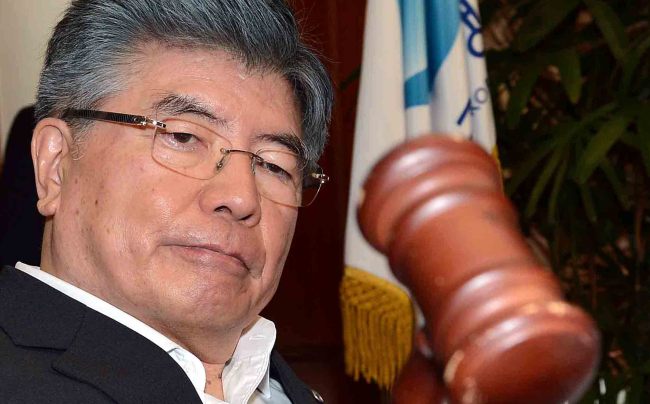 |
Bank of Korea Gov. Kim Choong-soo (Yonhap News) |
The Bank of Korea’s monetary policy committee kept its key rate unchanged at 2.50 percent for June after the central bank’s surprising and controversial slash of its benchmark interest rate last month.
BOK Gov. Kim Choong-soo said Thursday that brisk Korean exports in May led by strong sales of IT products, a positive outlook for global economic recovery and stable consumer prices led to the committee members’ unanimous decision to freeze the rate.
Solid exports and revived investment in the construction sector were able to offset slow consumption and facility investment, the BOK data indicated.
Given that the central bank lowered its rate last month to support the government’s fiscal stimulus, Kim said it held its rate steady this time as the BOK’s forecast that the combination of looser monetary policy and additional spending would take effect over the next six months to a year remained the same.
It expects that those monetary and fiscal measures will increase Korea’s growth by 0.2 percentage point in the second half of this year, and 0.3 percentage point next year, with expectations of low inflation.
The BOK had projected Korea to grow 2.6 percent, while the Finance Ministry predicted 2.3 percent. The Finance Ministry is expected to come out with an upward revision of its growth forecast in the upper 2 percent range on the back of its fiscal stimulus.
However, Kim underscored some risks and uncertainties that could put the brakes on global recovery efforts, including Korea’s effort to break away from its long period of low growth.
A possible early unwinding of quantitative easing in the U.S., Europe’s prolonged economic contraction and Japan’s recent aggressive policy to boost its monetary base could cause “negative spillover effects” on Korea and emerging economies.
Such macroeconomic factors could trigger capital outflow and increase volatility in the Korean stock, bond and foreign exchange markets.
The governor also mentioned that China, Korea’s biggest export destination, grew below market expectations as reasons for the need to be cautious. The world’s second-largest economy grew 7.7 percent in the first quarter on-year, down from 7.9 percent in the fourth quarter of last year, the BOK data showed.
The stock market fell to a year-to-date record low on Thursday, with the benchmark KOSPI sinking below the 1,900 mark to 1,882.73, a drop of 1.42 percent. The tech-heavy KOSDAQ finished at 540.82, down 0.98 percent.
Global concerns over an exit from monetary easing in the U.S. and the strengthening of the Japanese yen eroded confidence in Korean equities, analysts said.
The yen-dollar exchange reached 94 yen from a 52-week high of over 103 yen, casting a shadow over the prospect of Japan’s economy that relied on a weak yen to boost exports for recovery.
By Park Hyong-ki (hkp@heraldcorp.com)







